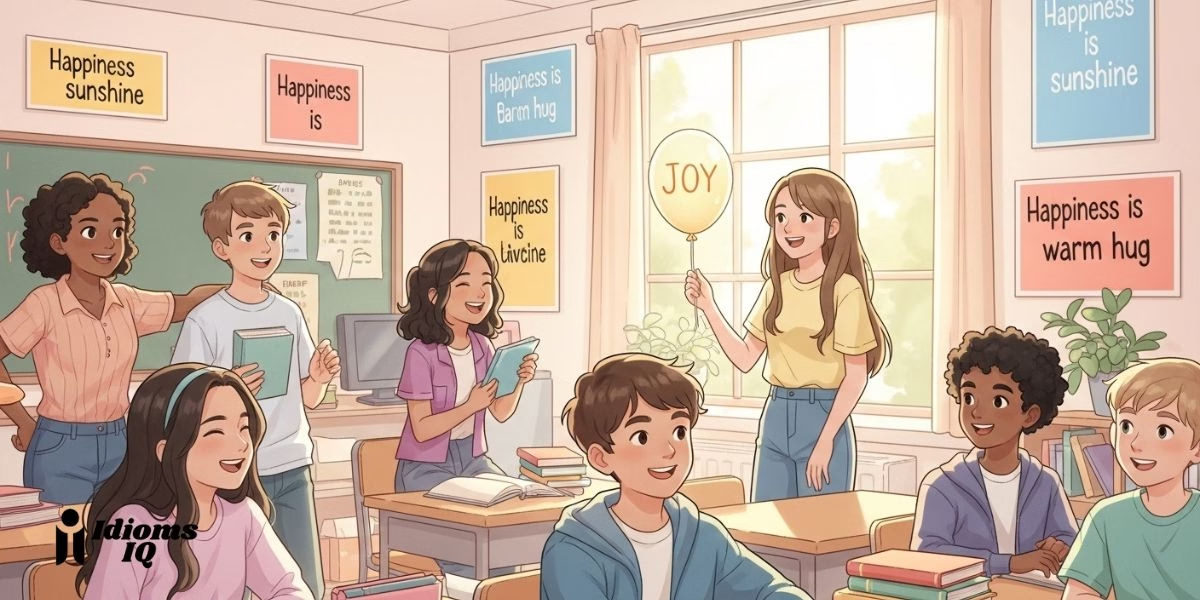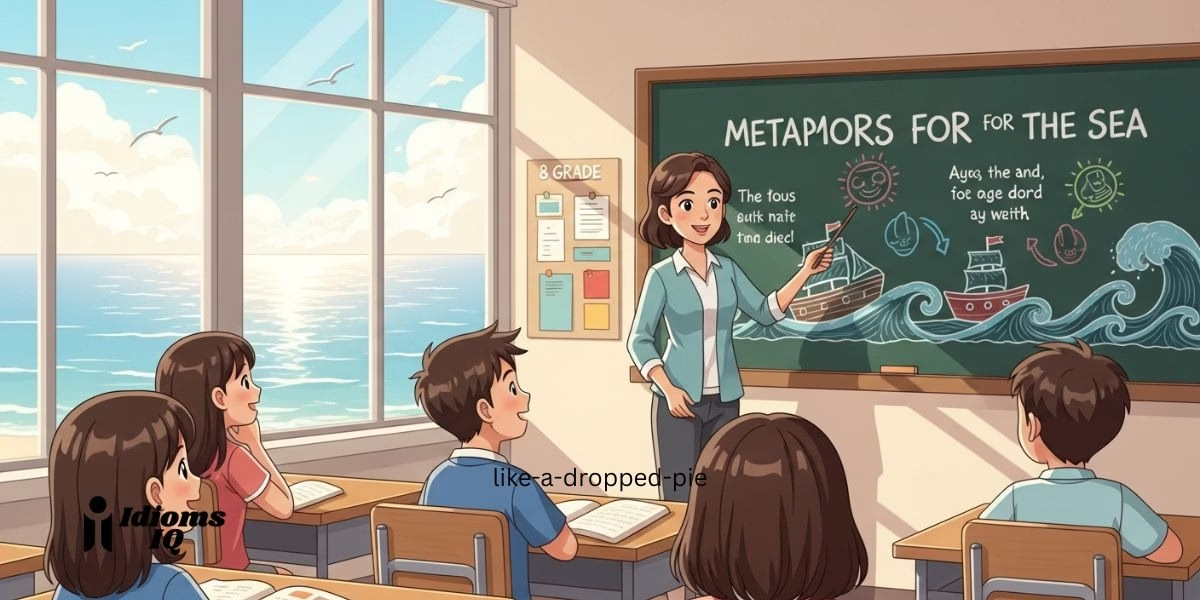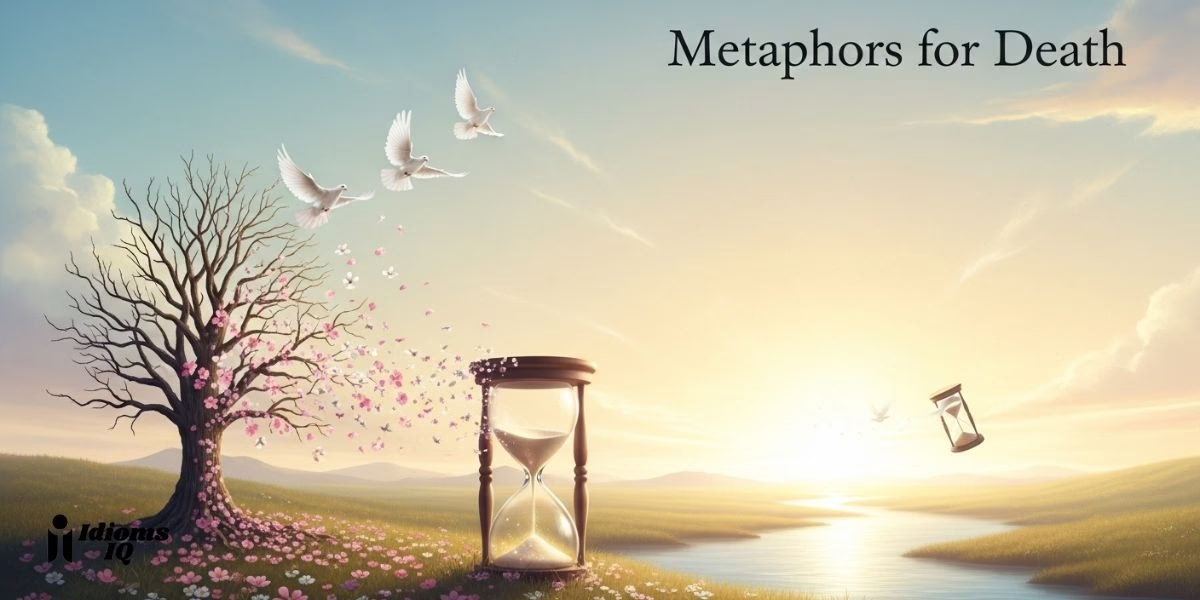
Death is one of life’s most profound and difficult subjects. Its finality can make it hard to discuss directly, leaving us searching for words that can hold its immense weight. This is where the power of metaphor shines. A metaphor is a figure of speech that helps us understand one concept by comparing it to another, creating a powerful mental and emotional connection.
They are the gentle language we use to explore life’s greatest mystery. In art, literature, and everyday conversation, metaphors for death allow us to frame this universal experience in ways that offer comfort, express our beliefs, and add layers of meaning. This article provides a comprehensive list of 40 metaphors for death, complete with their meanings and examples, to help you find the right words in difficult times.
Why We Use Metaphors for Death
Discussing death can be stark and emotionally jarring. Metaphors serve as a crucial bridge, allowing us to approach the topic with sensitivity and grace. They help us process grief by reframing death not as a brutal end, but as a transition a journey, a rest, or a return. By comparing death to natural processes like a sunset or a falling leaf, we make the abstract concept tangible and connect it to the cycles of life we already understand. This creative language helps to soften the harshness and express complex spiritual or philosophical beliefs about what may lie beyond.
Related: Metaphors for Darkness
Metaphors for Death
Here is a list of metaphors that provide different perspectives on the end of life.
1. The Final Chapter
- Meaning: The last part of a person’s life story.
- Usage Example: “Though we mourn, we must find peace in knowing he has written his final chapter.”
- This metaphor frames life as a book, providing a sense of narrative completion.
2. The Long Sleep
- Meaning: A state of eternal rest, free from pain and suffering.
- Usage Example: “After a long battle with illness, she has finally entered the long sleep.”
- This is a gentle and peaceful metaphor often used to comfort the grieving.
3. Crossing the River
- Meaning: A journey or transition from the world of the living to the next realm.
- Usage Example: “In his poem, he wrote of his grandfather crossing the river into the great beyond.”
- This image is common in many mythologies, like crossing the River Styx in Greek lore.
4. Returning to Dust
- Meaning: The body decomposing and becoming part of the earth again.
- Usage Example: “From ashes to ashes, we all must one day return to dust.”
- This biblical metaphor emphasizes the natural, physical cycle of life and death.
5. The Curtain Call
- Meaning: The end of a performance; the final moments of life.
- Usage Example: “The celebrated actor took his curtain call surrounded by his loving family.”
- This theatrical metaphor is often used for public figures or those who lived life with flair.
6. Fading into the Sunset
- Meaning: A peaceful and beautiful end to a long life.
- Usage Example: “Like a hero in an old film, he faded into the sunset after a life well-lived.”
- This metaphor evokes a sense of tranquility, closure, and natural beauty.
7. Answering the Final Summons
- Meaning: Responding to a call from a higher power or destiny.
- Usage Example: “The old soldier answered the final summons with courage and dignity.”
- This phrase has a formal, respectful tone, suggesting an unavoidable and honorable call.
8. Going Home
- Meaning: Returning to a place of origin, peace, or spiritual belonging.
- Usage Example: “Her faith gave her comfort that she was not dying, but simply going home.”
- This is a deeply comforting metaphor for those with strong spiritual or religious beliefs.
9. Reaching the End of the Road
- Meaning: The conclusion of life’s journey.
- Usage Example: “After ninety remarkable years, she had finally reached the end of the road.”
- This common metaphor frames life as a path or a journey with a clear beginning and end.
10. The Soul’s Release
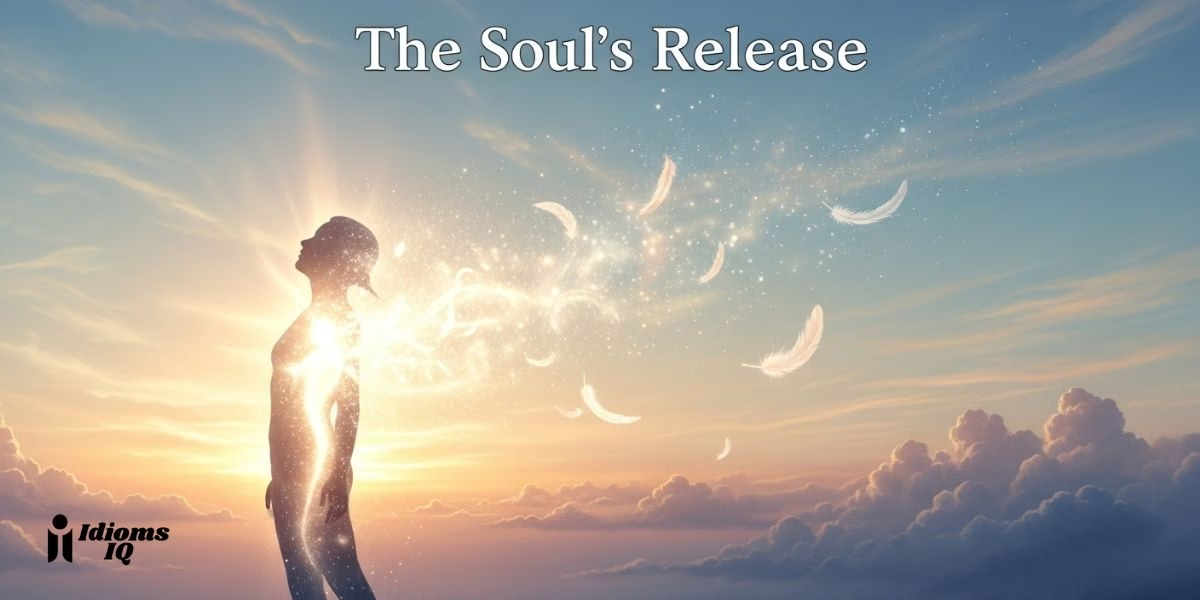
- Meaning: The spirit being freed from the physical limitations of the body.
- Usage Example: “Many find comfort in believing that death is the soul’s release.”
- This metaphor is often used in spiritual contexts that separate the soul from the body.
11. A Journey’s End
- Meaning: The completion of life’s travels and experiences.
- Usage Example: “His gravestone read, ‘Here marks a journey’s end’.”
- This phrase focuses on the culmination of a life full of experiences.
12. Passing the Torch
- Meaning: Handing over responsibilities, knowledge, or legacy to the next generation.
- Usage Example: “Before he passed, the founder felt he had successfully passed the torch to his successor.”
- This metaphor emphasizes legacy and continuation rather than an absolute end.
13. The Great Equalizer
- Meaning: Death is a universal state that comes to all, regardless of wealth or status.
- Usage Example: “Disease is a grim reminder that death is the great equalizer.”
- This philosophical metaphor reflects on the universal nature of mortality.
14. Shuffling Off This Mortal Coil
- Meaning: A poetic way of saying one has died, leaving the troubles of life behind.
- Usage Example: “In Hamlet’s famous soliloquy, he contemplates shuffling off this mortal coil.”
- This Shakespearean phrase is a classic literary metaphor for death.
15. Joining the Choir Invisible
- Meaning: Becoming part of a collective, spiritual existence with those who have died before.
- Usage Example: “The beloved singer has now joined the choir invisible.”
- This poetic metaphor, from a George Eliot poem, suggests a harmonious afterlife.
16. The Eternal Rest
- Meaning: A final, unending peace.
- Usage Example: “May he find eternal rest.”
- This is a common, prayerful phrase used in eulogies and condolences.
17. The Light Going Out
- Meaning: The cessation of life, consciousness, or vitality.
- Usage Example: “As the doctor shared the news, she felt as if a light had gone out in her world.”
- This metaphor can convey a sense of sudden loss and darkness.
18. A Star Returning to the Cosmos
- Meaning: An individual’s energy or essence rejoining the universe.
- Usage Example: “She believed that when we die, we are simply a star returning to the cosmos.”
- This beautiful, cosmic metaphor is popular in modern spiritual and secular circles.
19. The Machine Stopping
- Meaning: The body ceasing to function.
- Usage Example: “His heart was a tired machine that finally stopped.”
- This is a more clinical, mechanical metaphor that focuses on the body’s biological processes.
20. A Ship Sailing to a Distant Shore

- Meaning: Embarking on a final journey to an unknown destination.
- Usage Example: “We watched her go as if she were a ship sailing to a distant shore we could not see.”
- This metaphor captures a sense of mystery, departure, and a final farewell.
21. The Final Bow
- Meaning: The last act of one’s life, similar to an actor’s bow.
- Usage Example: “After a lifetime of service, the general took his final bow.”
- Like ‘curtain call’, this metaphor is often used for people who lived very public lives.
22. Passing Through the Veil
- Meaning: Moving from the physical world to a spiritual one.
- Usage Example: “Mystics believe that some can communicate with those who have passed through the veil.”
- This metaphor implies a thin separation between the world of the living and the dead.
23. The Last Breath
- Meaning: The final moment of life.
- Usage Example: “He was surrounded by loved ones when he drew his last breath.”
- This is a literal yet metaphorical phrase representing the end of biological life.
24. A Candle in the Wind
- Meaning: A life that is fragile and easily extinguished.
- Usage Example: “Elton John’s song describes Marilyn Monroe’s life as a candle in the wind.”
- This metaphor is often used to describe a life cut tragically short.
25. The Unending Dream
- Meaning: Death as a transition into a permanent, dream-like state.
- Usage Example: “He is not gone, he has just entered the unending dream.”
- This offers a peaceful, surrealist perspective on what comes after life.
26. Joining the Ancestors
- Meaning: Being reunited with one’s forefathers in the afterlife.
- Usage Example: “The tribal elder has gone to join the ancestors.”
- This is a culturally significant metaphor in many indigenous traditions.
27. The Body Betraying You
- Meaning: The failure of one’s physical health, leading to death.
- Usage Example: “In the end, she felt her body had betrayed her.”
- This metaphor can express the frustration and sense of powerlessness of terminal illness.
28. The Final Harvest
- Meaning: The culmination of one’s life, gathered by a natural or divine force.
- Usage Example: “The Grim Reaper is often depicted as carrying a scythe for the final harvest.”
- This agricultural metaphor links death to the cycles of planting and reaping.
29. The Door at the End of Life
- Meaning: A passageway from one existence to the next.
- Usage Example: “She wasn’t afraid, seeing death as just a door at the end of life.”
- This metaphor suggests a simple transition rather than a scary finality.
30. A Clock Stopping
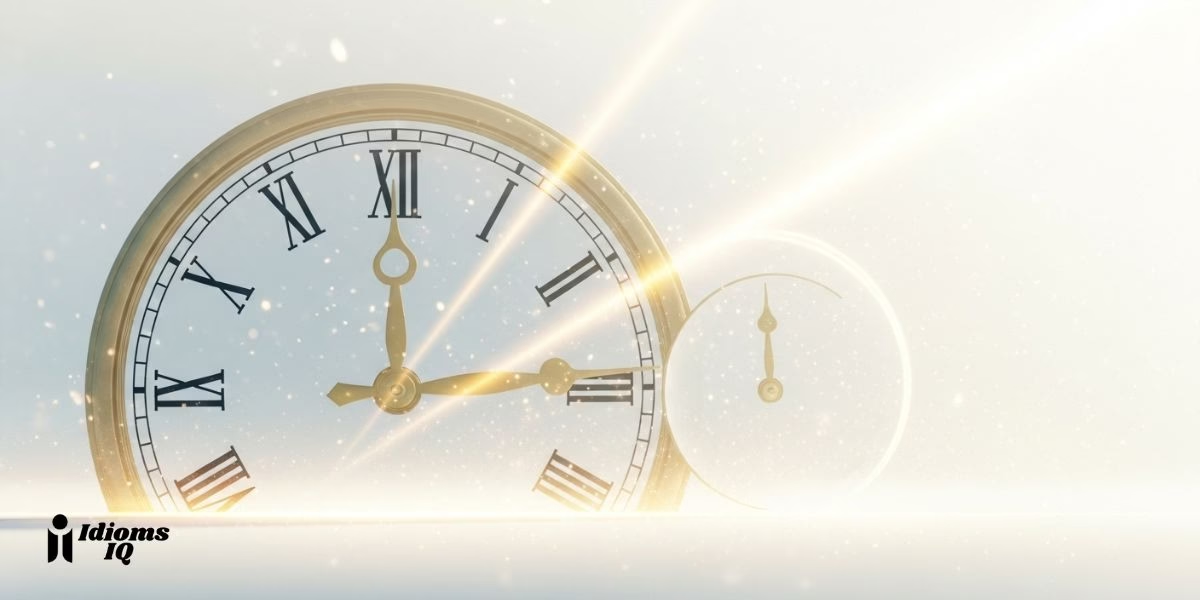
- Meaning: The abrupt end of a measured time (one’s life).
- Usage Example: “It felt as if a great clock had stopped the moment he died.”
- This metaphor highlights the cessation of time for the individual who has passed.
31. Returning to the Source
- Meaning: The essence of a person rejoining its universal or divine origin.
- Usage Example: “In her meditation, she found peace with the idea of returning to the source.”
- This is a common spiritual metaphor found in many Eastern and Western philosophies.
32. The Great Adventure
- Meaning: Death as the beginning of a new, unknown, and exciting journey.
- Usage Example: “As J.M. Barrie wrote for Peter Pan, ‘To die will be an awfully big adventure’.”
- This reframes death from something to be feared into something to be met with curiosity.
33. The Fallen Leaf
- Meaning: A natural and inevitable part of the life cycle.
- Usage Example: “Like a fallen leaf, he returned to the earth to nourish new life.”
- This gentle, natural metaphor emphasizes beauty and acceptance.
34. The Setting of a Star
- Meaning: The end of a bright and influential life.
- Usage Example: “The scientific community mourned the setting of a star with the professor’s passing.”
- This metaphor is used to describe the death of someone brilliant or famous.
35. The Debt Paid
- Meaning: The idea that life is borrowed and must eventually be returned.
- Usage Example: “He believed life was a gift, and in death, the debt is paid.”
- This metaphor frames mortality as a universal, inescapable obligation.
36. An Empty Chair at the Table
- Meaning: The void and absence left behind by someone’s death.
- Usage Example: “The holidays were difficult, marked by the empty chair at the table.”
- This powerful metaphor focuses on the impact of loss on the survivors.
37. The Last Page Turned
- Meaning: The final conclusion of a person’s life story.
- Usage Example: “With his passing, the last page was turned on an incredible era.”
- Similar to ‘final chapter,’ this emphasizes a sense of finality and completion.
38. Meeting One’s Maker
- Meaning: A religious concept of facing God or a creator after death.
- Usage Example: “After a life of faith, he was ready to meet his maker.”
- This is a common euphemism in Abrahamic religious traditions.
39. The Road Bending
- Meaning: A point where life’s path disappears from our view, but doesn’t necessarily end.
- Usage Example: “Death is not extinguishing the light; it is only putting out the lamp because the dawn has come.”
- This metaphor, from Rabindranath Tagore, suggests a transition to a new kind of existence.
40. Becoming a Memory
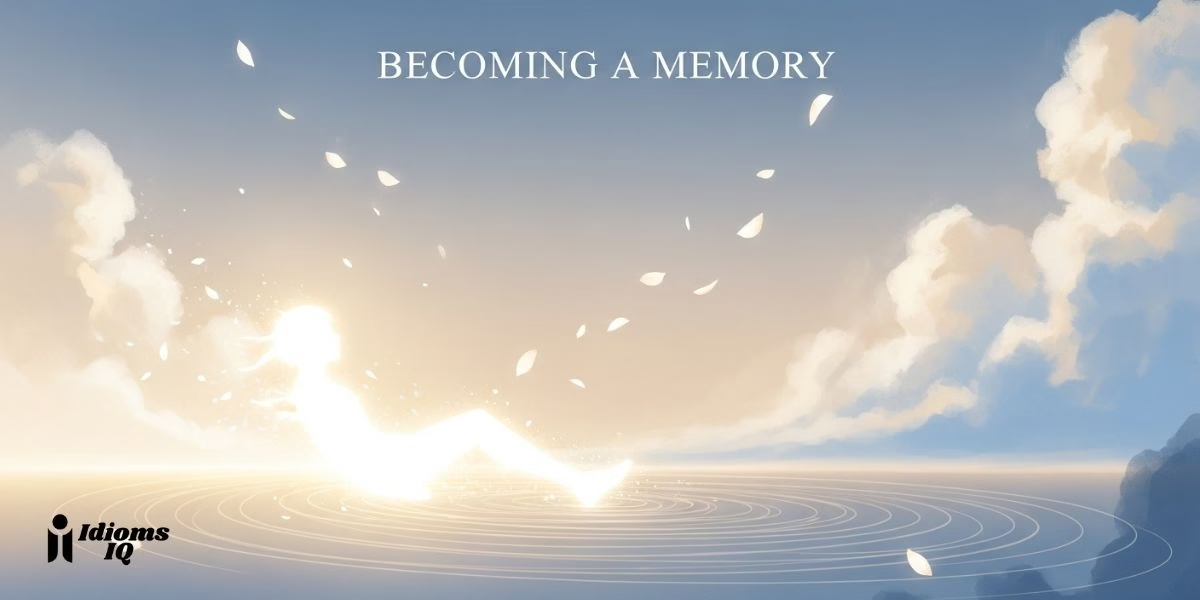
- Meaning: Ceasing to exist physically but continuing to live in the minds of others.
- Usage Example: “He is no longer with us, but he has become a cherished memory.”
- This focuses on the legacy and impact a person leaves behind.
Practice Your New Vocabulary: Fill in the Blanks
Ready to use these artistic metaphors? Fill in the blanks with the most fitting phrase from the list.
- Life is a story, and he has now written his ________________.
- After a lifetime of good deeds, she was not afraid of ________________.
- The play of his life is over, and he has taken his ________________.
- She believed her beloved pet had crossed the ________________.
- His last wish was for his ashes to be scattered so he could ________________.
- Death comes for both the king and the pauper; it is ________________.
- The tragic death of the young poet was like a ________________.
- My grandmother said her husband wasn’t gone, he was just ________________.
- He lived with no regrets, so when he reached the ________________, he was at peace.
- The grief was overwhelming, a constant reminder of the ________________ at their dinner table.
Answers
- final chapter
- meeting her maker
- curtain call
- rainbow bridge (A common variant for pets, related to crossing the river)
- return to dust
- the great equalizer
- candle in the wind
- going home
- end of the road
- empty chair
Conclusion
Metaphors provide us with a diverse palette to paint our understanding of death. They allow us to speak about the unspeakable, offering shades of meaning that range from peaceful to philosophical, from spiritual to natural.
Whether you are comforting a friend, writing a eulogy, or simply contemplating life’s mysteries yourself, using these metaphors can enrich your expression and deepen your understanding.
They are a testament to how language helps us navigate our most profound experiences. We invite you to explore our other collections of metaphors and idioms to continue building a more expressive and creative vocabulary!


